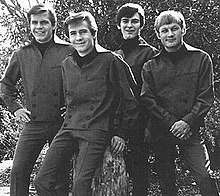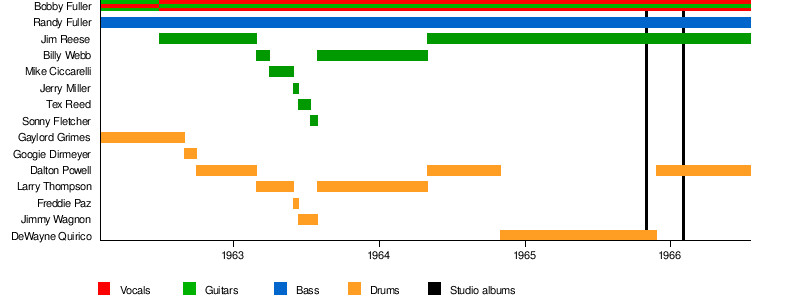The Bobby Fuller Four
The Bobby Fuller Four (sometimes stylized as Bobby Fuller 4) was a popular mid-1960s American rock & roll band started by Bobby Fuller. With its first incarnation formed in 1962 in El Paso, Texas, the group went on to produce some of its most memorable hits under Mustang Records in Hollywood, California. The band's most successful songs include "Let Her Dance", "I Fought the Law", and "Love's Made a Fool of You."[1]
The Bobby Fuller Four | |
|---|---|
 | |
| Background information | |
| Also known as | The Spiders, Bobby Fuller and the Fanatics, The Shindigs |
| Origin | Texas, United States |
| Genres | Rock and roll |
| Years active | 1962–1966 |
| Labels | Donna, Eastwood, Exeter, Liberty, Mustang, Todd, Yucca |
| Past members |
|
History
Even before Fuller had established a band in his hometown of El Paso, he recorded his first single, "You're in Love", under Yucca Records in 1961 with assistance of the Embers, a local band that Fuller played in previously. At this point, he started his own band, backed by his brother Randy on bass and Gaylord Grimes on drums in 1962. After "You're in Love" was a regional hit, Fuller had his next single, "Gently My Love" professionally recorded at Norman Petty Recording Studios. While producing another regional hit, Fuller was displeased with the results.
They disengaged from Yucca, and released their records through Fuller's own various independent labels; the recordings were done in Fuller's home recording studio. The group never had a definite name; recordings were either credited to simply Bobby Fuller, or Bobby Fuller and the Fanatics. Various other members (now including a second guitarist in addition to Fuller) played in the band at this time; however, the most significant were Jim Reese (formerly of the Embers) on guitar, and Dalton Powell (who had previously played piano for the Embers) on drums, while Bobby Fuller and Randy Fuller stayed constant on guitar and bass, respectively.
By 1963, the band pursued a record deal with a major label in Hollywood, California.[1] While they were neglected by most labels, Bob Keane of Del-Fi Records showed particular interest in the group. While he saw potential, he didn't think the band had hit material yet. Fuller and his band returned to El Paso and continued to release regional hits, the most popular being "I Fought the Law," originally by the Crickets. By the end of 1964, Fuller saw branching out to a major label as their only option, thus Bobby Fuller, Randy Fuller, and Jim Reese prepared to move to California to revisit Del-Fi Records. Current drummer Dalton Powell could not make the move due to family commitments, and was replaced by another drummer, DeWayne Quirico, instructed by Fuller in person.
Del-Fi Records
With the group's new hit records, Keane signed them to Del-Fi this time around. The band's first Del-Fi release, "Those Memories of You" was under the sister label, Donna records (credited to Bobby Fuller and the Fanatics). With the band's increasing local popularity, Keane created a sister label just for Fuller's band, Mustang Records. The first release on Mustang was "Thunder Reef" in 1965. This time, the band was credited as The Shindigs to capitalize on the new ABC show, Shindig! Seeking a more permanent name, Keane decided upon The Bobby Fuller Four (as he favored Fuller), which was first used on the band's next single, "Take My Word." The new name received mixed reactions with the rest of the group, claiming that it put too much emphasis on Fuller, as opposed to the rest of the band, but the name stuck.
While their next release, "Never to be Forgotten" brought a regional hit, the band's next single, "Let Her Dance" brought the band's first national hit, barely missing the Billboard Hot 100 at 133, though bringing in a Top 40 hit. At the suggestion of Randy Fuller, the El Paso hit, "I Fought the Law" was re-recorded. It quickly gained national popularity, and by 1966, it rose to its peak position at #9 on the national charts. Meanwhile, the band was starting to experience internal troubles after touring, and drummer DeWayne Quirico abruptly left the group. John Barbata was asked to take his place, while negotiations were underway to get Dalton Powell back in the band.
With Powell reinstated, the group went on to release "Love's Made a Fool of You," another Crickets cover (written by Buddy Holly and Bob Montgomery and recorded by Holly as a demo, reportedly intended for the Everly Brothers, though never recorded by that duo). This went on to become another national hit for the band. The next single was taken from the sessions where Barbata sat in, "The Magic Touch." While being popular locally, it did not match the success of the previous singles. In addition to the already existing internal problems, the band began to fall apart in July after Reese had received a draft notice in the mail (and arranged to sell his Jaguar XKE to Fuller), Powell also planned to announce his plans to leave the band to support his family back home.
Aftermath
Bobby Fuller died under mysterious circumstances on July 18, 1966. His body was found beaten inside his car parked just outside of his Hollywood home. Evidence suggests that he had ingested gasoline. Initially, these details were not released to the public. Although, many of his friends suspected he might have been murdered by mobsters, Fuller's death was officially ruled a suicide by police.[1]
After the death of Fuller, the band abruptly disbanded. The group's final single, "It's Love, Come What May" was only released in limited quantities as a promotional recording. Months later, Keane arranged the formation of the Randy Fuller Four in an attempt to capitalize on the previous success of the Bobby Fuller Four, complete with Randy Fuller on bass and rhythm guitar, DeWayne Quirico returning on drums, and Mike Ciccarelli and Howard Steele (other former El Paso musicians) on lead guitar and bass, respectively. The group released a few singles (including overdubbing the Bobby Fuller Four's "It's Love, Come What May"), but disbanded less than a year later in 1967 without any chart success.[1][2]
Most former members of the Bobby Fuller Four remained active in the music industry after the group disbanded. Jim Reese died in 1991 after suffering a fatal heart attack whilst playing a round of golf.
Discography
Singles
| Year | Single (A-side, B-side) Both sides from same album except where indicated |
Label and number | US[3] | Album |
|---|---|---|---|---|
| 1961 | "You're in Love"1 b/w "Guess We'll Fall in Love" |
Yucca 140 | Non-album tracks | |
| 1962 | "Gently, My Love"1 b/w "My Heart Jumped" |
Yucca 144 | ||
| "Nervous Breakdown"1 b/w "Not Fade Away" |
Eastwood (No #) | |||
| 1963 | "Saturday Night"1 b/w "Stringer" |
Todd 1090 | ||
| 1964 | "King of the Beach"1 b/w "Wine, Wine, Wine" |
Exeter 122 | ||
| "I Fought the Law"1 b/w "She's My Girl" |
Exeter 124 | |||
| "Fool of Love"2 b/w "Shakedown" |
Exeter 126 | |||
| "Those Memories of You"2 b/w "Our Favorite Martian" |
Donna 1403 | |||
| "Wolfman"3 b/w "Thunder Reef" |
Mustang 3003 | |||
| 1965 | "Take My Word"A b/w "She's My Girl" |
Mustang 3004 | KRLA King of the Wheels | |
| "Let Her Dance"A b/w "Another Sad and Lonely Night"A Also released on Liberty 55812 and Mustang 3012 |
Mustang 3006 | 133 | ||
| "Never to Be Forgotten"A b/w "You Kiss Me" (from I Fought the Law) |
Mustang 3011 | |||
| "I Fought the Law" b/w "Little Annie Lou"A (from KRLA King of the Wheels) |
Mustang 3014 | 9 | I Fought the Law | |
| 1966 | "Love's Made a Fool of You" b/w "Don't Ever Let Me Know" |
Mustang 3016 | 26 | Non-album tracks |
| "The Magic Touch" b/w "My True Love" |
Mustang 3018 | 117 | ||
| "It's Love, Come What May"4 b/w "Wolfman" |
Mustang 3020 | |||
ATracks from the first Mustang album also featured on the follow-up album "I Fought the Law"
1 Singles released as by Bobby Fuller
2 Released as by Bobby Fuller and The Fanatics
3 Released as by The Shindigs
4 Released as by Randy Fuller, but actually recorded by The Bobby Fuller Four with Randy's vocals overdubbed on A-side
Original US albums
- KRLA King of the Wheels (Mustang M-900 [mono] / MS-900 [stereo], 1965)
- I Fought The Law (Mustang M-901 [mono] / MS-901 [stereo], 1966)
- Celebrity Night At PJ's (cancelled — originally to be released as Mustang M-902 [mono] / MS-902 [stereo]; finally issued in the Never To Be Forgotten: The Mustang Years box set)
Compilations and reissues
- The Bobby Fuller Memorial Album (LP, President 1003, 1968)
- The Best of the Bobby Fuller Four (LP, Rhino RNDF-201, 1981)
- KRLA King of the Wheels (LP, Line LP-5146, 1981)
- I Fought the Law (LP, Line LP-5133, 1981)
- The Bobby Fuller Memorial Album (LP, Strand 6.24885, 1982)
- Let Them Dance (The Rare Sides) (LP, OutLine OLLP-5272, 1983)
- Live on Stage (LP, OutLine OLLP-5302, 1983)
- I Fought the Law (LP, Eva 12032, 1983)
- Live Again (LP, Eva 12046, 1984)
- The Best of The Bobby Fuller Four (CD, Rhino 70174, 1990)
- The Bobby Fuller Four (CD, Ace CDCHD-956, 1990)
- Live at PJ's...Plus! (CD, Ace CDCHD-314, 1991)
- The Best of The Bobby Fuller Four (CD, Ace CDCHD-388, 1992)
- The Bobby Fuller Four (CD, Del-Fi DFCD-70174, 1994)
- Never to Be Forgotten: The Mustang Years (3-CD box set, Mustang/Del-Fi DFBX-3903, 1997)
- The Mustang Years (2LP, Munster MR-184, 2000)
- I Fought the Law and Others (7" EP, Munster 7141, 2000)
- I Fought the Law: The Best of The Bobby Fuller Four (CD, Del-Fi/Rhino 71904, 2001)
- I Fought the Law and Other Hits (CD, Flashback/Rhino 78170, 2004)
- Rhino Hi-Five: The Bobby Fuller Four (CD, Rhino 7????, 2006)
- Magic Touch: The Complete Mustang Singles Collection (CD, Now Sounds [UK] WCRNOW-57, 2018)
Members
Timeline

References
- Bashe, P. R., & George-Warren, H., The Rolling Stone Encyclopedia of Rock & Roll (Third ed.). New York, Fireside, 2005, p. 360
- Nick Warburton (2009-04-10). "Randy Fuller". Garage Hangover. Retrieved 2014-08-23.
- The Bobby Fuller Four - Chart History - The Hot 100, Billboard.com. Retrieved May 31, 2017.